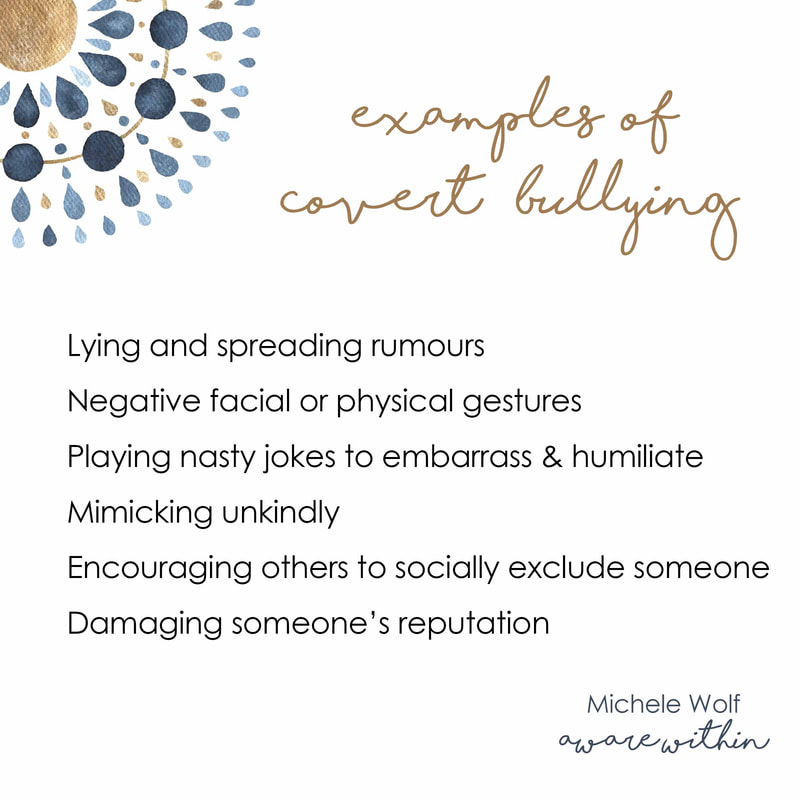Covert or Passive-Aggressive Bullying
|
Covert or Passive-Aggressive bullying is a form of hidden aggression where harm is done through damage to relationships or social status within a group.
Most of us encounter bullies in our lives which includes in adult life too. With many bullies, you can see them coming because they are quick to make their intimidating presence known. A passive-aggressive or covert bully, however, is cunning in that they behave appropriately on the surface, but take you down with subtlety. Examples of covert bullying include negative gossip, negative joking at someone’s expense, sarcasm, hurtful jokes, gaslighting, condescending eye contact, facial expression or gestures, mimicking to ridicule, deliberately causing embarrassment and insecurity, the invisible treatment, social exclusion, professional isolation, and deliberately sabotaging someone’s well-being, happiness, and success. They may also isolate their targets, causing them to feel anxious and insecure. Here are 5 more indicators of covert bullying: 1. Your feelings - Targets of covert bullies sometimes deny that they're being bullied, even though they feel bullied. Many believe, incorrectly, that all bullying must be blatantly offensive, abusive, and hostile. If you feel bullied, there's a strong chance that you're being bullied, no matter how "nice" the bully is. 2. The use of privacy - Since covert bullies want to maintain an image of innocence, they avoid any witnesses. 3. Spell-casting - The primary goal of bullies is the exercise of power. Bullies seek to coerce others to carry out tasks against their wishes. The overt bully uses force or threats to carry out the coercion, but the covert bully favours subtle manipulation, deceit, and trickery. Consequently, the target might actually experience a desire to please the covert bully. 4. Confusion - Because the bullying is covert, targets can be unsure if it's really happening, looking for alternate explanations for their feelings of being abused. 5. The roller coaster - Occasionally, targets begin to sense that bullying is happening. Sensing these changes, covert bullies then take steps to repair relationships using a variety of tactics. They grant favours, do favours unbidden, or voluntarily step forward to heroically assume undesirable responsibilities. This alternation of abuse and graciousness confuses targets. Bullying can happen at any age. It is very a frustrating and painful experience. Learn and assert boundaries to protect your personal space. |
"Some people try to be tall by cutting off the heads of others.” ~ Paramahansa Yogananda
An adult bully can be condescending, shaming, aggressive, demanding, and domineering. Along with using a different approach and assertive communication, here are 7 points to help you handle things differently: 1. Keep safe and don't engage - If possible and if necessary, keep your distance because sometimes it's not worth expending your energy. 2. Keep your cool - A common characteristic of bullies is that they project their aggression to push your buttons and keep you off balance. By doing so, they create an advantage from which they can exploit your weaknesses. If you avoid being reactive you're better able to maintain your composure and use good judgement. 3. Choose a response - Some scenarios require a strong and assertive response, while other scenarios may be handled simply with you being unimpressed, or walk away. 4. Effective, assertive communication - Deal with the problem early on and set consequences. Identify and assert consequence(s) to "stand down" a difficult person. When effectively articulated, strong and reasonable consequence(s) gives pause to the adult bully and compels him or her to shift from violation to respect. 5. Talk about it - Instead of being a quiet victim, talk about it with safe others and/or with a therapist. 6. Formal communication - Sometimes, you may need to formalize your communication, keep a paper trail of facts, and have witnesses. 7. Get help - Don't hesitate and don't wait to get help when you feel like you need it. Tell a friend or loved one that you are being bullied. In severe situations, you may need to take the issue to a higher authority. |
Michele Wolf - Registered Psychotherapist - Aware Within - Psychotherapy
Located from the Collingwood Blue Mountains area and virtually serving all of Ontario including
Collingwood, Stayner, Thornbury, Meaford, Owen Sound, Midland, Barrie,
Guelph, Hamilton, Kitchener-Waterloo, Orangeville, Ottawa, Thunder Bay, and all other areas.
Collingwood, Stayner, Thornbury, Meaford, Owen Sound, Midland, Barrie,
Guelph, Hamilton, Kitchener-Waterloo, Orangeville, Ottawa, Thunder Bay, and all other areas.
Home | About | Therapist-Meet Michele | Services | Wild Soul Journey Blog
Journeys - Women's Circles | FAQ | Contact | Book an Appointment
Journeys - Women's Circles | FAQ | Contact | Book an Appointment


